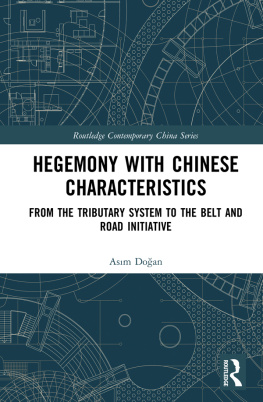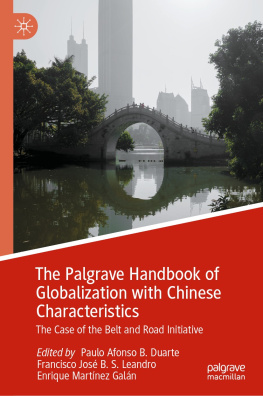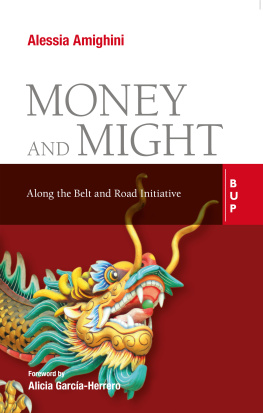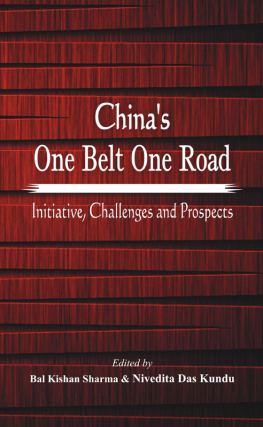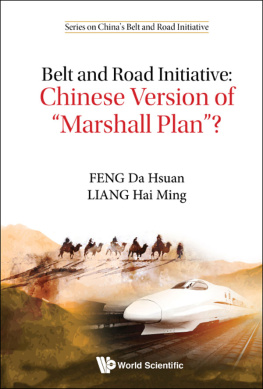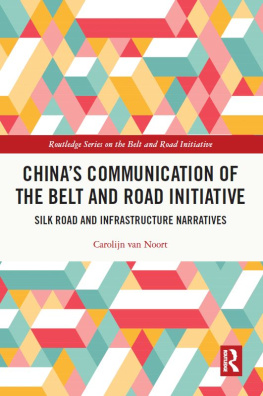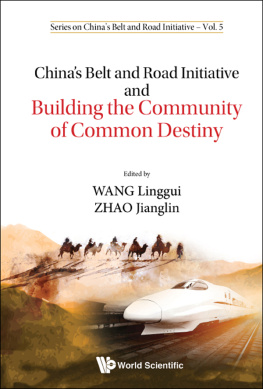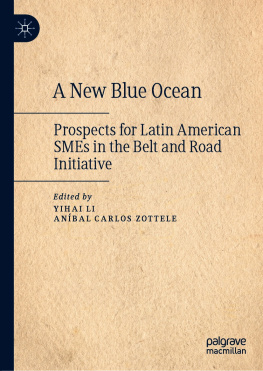Hegemony with Chinese Characteristics
Hegemony with Chinese Characteristics compares the historical relationship of China with its neighbors to the developing trajectory of the Belt and Road Initiative, and asks what this tells us about the kind of hegemon China is likely to become.
China is going to play a more active and decisive role in the international community and there is much uncertainty about how China will handle its responsibilities and interests. The ambiguous and assertive Belt and Road Initiative is a matter of special concern in this aspect. The Tributary System, which provides concrete evidence of how Chinese dynasties handled relations with foreigners, is a useful reference point in trying to understand its twenty-first century developments. This is particularly true, because after the turbulence of the Century of Humiliation and the Maoist Era, China seems to be explicitly re-embracing its history and its pre-revolutionary identity. Confucius, one of the biggest targets of the Cultural Revolution, is being rehabilitated alongside Confucianism, Taoism, Buddhism and other ideologies and philosophies suppressed in the Mao era. Dogan analyzes the extent to which Chinas current approach to foreign relations resembles its earlier models.
Grounded in hegemony as an analytic lens, this book provides an innovative study of the power generated by the global rise in China. It will be a valuable resource for scholars and students of Chinese foreign policy and international relations and serve as a benchmark for further studies.
Asm Dogan lived and engaged in business with his own company in Hong Kong and Mainland China for 18 years, and has an MA in Public Management from The Chinese University of Hong Kong and a PhD in Political Science and International Relations.
Routledge Contemporary China Series
Doing Labor Activism in South China
The Complicity of Uncertainty
Darcy Pan
Chinese Energy Companies in Africa
Implications for the Foreign Policy of an Authoritarian State
Kasandra Behrndt-Eriksen
Chinas International Socialization of Political Elites in the Belt and Road Initiative
Theodor Tudoroiu
Regional Inequality in Transitional China
Haifeng Liao, Dennis Wei and Li Huang
Modern Art for a Modern China
Yiyan Wang
Ethnic Minorities, Media and Participation in Hong Kong
Creative and Tactical Belonging
Lisa Y.M. Leung
The Politics of Waste Management in Greater China
Environmental Governance and Public Participation in Transition
Natalie Wai Man Wong
Hegemony with Chinese Characteristics
From the Tributary System to the Belt and Road Initiative
Asm Dogan
For more information about this series, please visit: https://www.routledge.com/Routledge-Contemporary-China-Series/book-series/SE0768
Hegemony with Chinese Characteristics
From the Tributary System to the Belt and Road Initiative
Asm Dogan
First published 2021
by Routledge
2 Park Square, Milton Park, Abingdon, Oxon OX14 4RN
and by Routledge
52 Vanderbilt Avenue, New York, NY 10017
Routledge is an imprint of the Taylor & Francis Group, an informa business
2021 Asm Dogan
The right of Asm Dogan to be identified as author of this work has been asserted by him in accordance with sections 77 and 78 of the Copyright, Designs and Patents Act 1988.
All rights reserved. No part of this book may be reprinted or reproduced or utilised in any form or by any electronic, mechanical, or other means, now known or hereafter invented, including photocopying and recording, or in any information storage or retrieval system, without permission in writing from the publishers.
Trademark notice: Product or corporate names may be trademarks or registered trademarks, and are used only for identification and explanation without intent to infringe.
British Library Cataloguing-in-Publication Data
A catalogue record for this book is available from the British Library
Library of Congress Cataloging-in-Publication Data
Names: Dogan, Asm, author.
Title: Hegemony with Chinese characteristics: from the tributary
system to the Belt and Road Initiative/Asm Dogan.
Description: London; New York: Routledge, 2021. |
Series: Routledge contemporary China series |
Includes bibliographical references and index.
Identifiers: LCCN 2020048158 (print) | LCCN 2020048159 (ebook) |
ISBN 9780367751074 (hardback) | ISBN 9780367751067 (paperback) |
ISBN 9781003161004 (ebook)
Subjects: LCSH: HegemonyChinaHistory. | ChinaForeign relations. |
Tributary system (China) | Yi dai yi lu (Initiative: China)
Classification: LCC DS740.4 D64 2021 (print) |
LCC DS740.4 (ebook) | DDC 327.51dc23
LC record available at https://lccn.loc.gov/2020048158
LC ebook record available at https://lccn.loc.gov/2020048159
ISBN: 978-0-367-75107-4 (hbk)
ISBN: 978-0-367-75106-7 (pbk)
ISBN: 978-1-003-16100-4 (ebk)
Typeset in Galliard
by Newgen Publishing UK
Contents
ABC | Agricultural Bank of China |
AIIB | Asia Infrastructure and Investment Bank |
ASEAN | Association of South East Asian Nations |
BOC | Bank of China |
BRI | Belt and Road Initiative |
BRICS | Brazil, Russia, Indonesia, China, South Africa |
CCB | China Construction Bank |
CCP | Chinese Communist Party |
CDB | China Development Bank |
EIBC | Export-Import Bank of China |
EU | European Union |
HSBC | Hongkong and Shanghai Banking Corporation |
ICBC | Industrial and Commercial Bank of China |
IMF | International Monetary Fund |
NDB | New Development Bank |
SRF | Silk Road Fund |
WTO | World Trade Organization |
In social sciences some specific terms can evoke different meanings or imply different nuances in different societies from specific cultural backgrounds and historical experiences. Hegemony is such a term. The exact meaning of hegemony in the modern international academic community and in Chinese language and culture has differences in nuances. Before examining the Tributary System and Belt and Road Initiative, the nuances in definitions of hegemony must be clarified to comprehend its exact meaning and differences according to the international actors.
Hegemony, hegemonia and hegemon initially originated from the Greek word hegeisthai, which means to lead. Hegemonia literally means leadership, and it is derived from the word hegemon, which means leader. Hegemonia was first used in the English language in the mid-16th century and finally evolved into todays final form we use: Hegemony (Kaymak, : 218).

